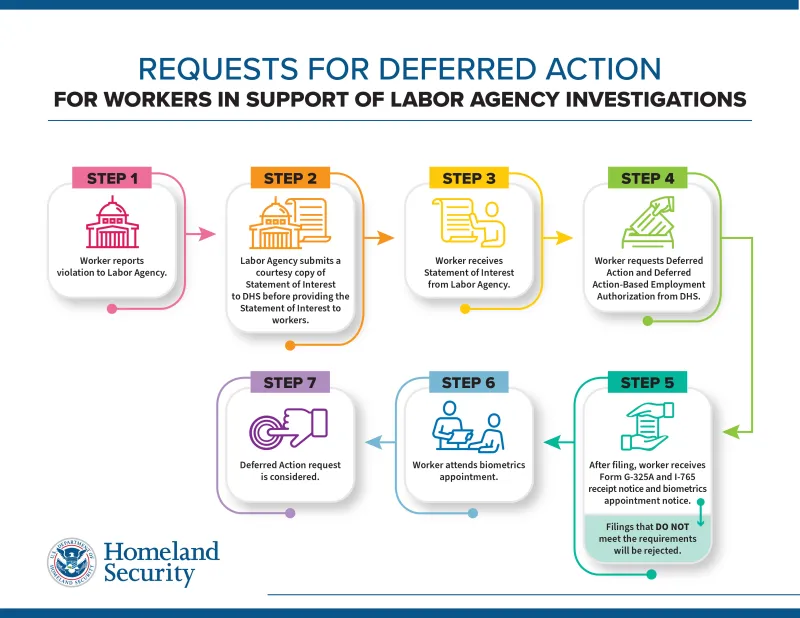Human Trafficking, U/T Visa Certification, Deferred Action/Statement of Interest
This webpage provides information about human trafficking, including information about how to request that CRD investigate a complaint of human trafficking as well as information about relief that may be available to survivors. In addition, this webpage provides information about how to request CRD’s support in requests to the federal government for deferred action and/or visa certification that are available to victims of certain crimes or labor violations and who assist CRD’s enforcement of the law.
DEFERRED ACTION/STATEMENT OF INTEREST
en Español: Acción Diferida
About CRD: The California Civil Rights Department (CRD) enforces the state’s laws that prohibit discrimination and harassment in employment, housing, business, and state-funded programs, as well as hate violence and human trafficking. CRD’s role as a civil law enforcement agency is to investigate complaints and bring enforcement actions alleging violations of those laws.
CRD is dedicated to protecting the rights of complainants, regardless of their immigration status. CRD does not ask about an individual’s immigration status while investigating complaints. For more information about the rights of noncitizens under California’s civil rights laws, visit: https://calcivilrights.ca.gov/Posters/.
CRD and deferred action: Certain noncitizen workers who are victims of, or witnesses to, labor rights violations may be afraid to complain or cooperate in a CRD investigation or enforcement action because they fear removal/deportation or reports of immigration status. However, a process called “deferred action” administered by the U.S. Department of Homeland Security (DHS) may be available to noncitizen workers who wish to report violations of employment or labor laws. As described below, deferred action delays immigration enforcement actions for up to two years for workers who fall within the scope of a labor agency investigation or enforcement action. DHS has set out an inclusive standard for deferred action to address the broad chilling effect that immigration enforcement can have on labor standards investigations. As part of this process, DHS will consider Statements of Interest submitted by CRD (or another agency) in support of a worker or group of workers. A Statement of Interest from CRD is a letter that describes the worksite and the workers within the scope of the CRD investigation or enforcement action. The individuals who fall within that description are then eligible to apply individually for deferred action.
As a result, CRD actively accepts and considers requests for Statements of Interest in support of deferred action for workers. Below, CRD provides answers to frequently asked questions about when and how to ask CRD for support in requesting deferred action.
1. What is deferred action?
DHS can decide when to pursue removal (deportation) of certain noncitizens. Deferred action is a form of prosecutorial discretion and means that DHS, in its discretion, may delay a person’s deportation for a certain period of time.
In January 2023, DHS issued updated guidance and announced an expedited process for consideration of deferred action requests from workers who are victims of, or witnesses to, the violation of labor rights.
For more information, visit:
https://www.dhs.gov/news/2023/01/13/dhs-announces-process-enhancements-supporting-labor-enforcement-investigations
In addition, DHS has now created a centralized intake point for deferred action requests from workers who are supported by labor and employment agencies, including departments like CRD. For more information, visit:
https://www.dhs.gov/enforcement-labor-and-employment-laws
2. Does CRD support requests for deferred action?
Yes. CRD encourages workers and their advocates to request CRD’s support for deferred action when it may protect workers and further CRD’s mission and priorities. Under DHS guidance, CRD’s role in supporting deferred action is limited to submitting a Statement of Interest to DHS.
In its discretion, and on a case-by-case basis, CRD may submit a Statement of Interest to DHS supporting deferred action for any number of workers. Typically, a Statement of Interest will identify particular worksites during a specific time period. Unless individual circumstances demand it and prior notice is given, CRD will never name individual workers in a Statement of Interest submitted to DHS. CRD will also seek to avoid including factual information that would risk identifying individual workers.
After DHS confirms it has received CRD’s Statement of Interest, CRD will provide the Statement of Interest to the worker and, if applicable, their advocate. Workers covered by that Statement of Interest may include it with their individual requests for deferred action that must be submitted by mail to the U.S. Citizenship and Immigration Services (USCIS), which is part of DHS. For more information on how to request deferred action, visit:
https://www.dhs.gov/enforcement-labor-and-employment-laws
3. Who can request a Statement of Interest from CRD?
Any impacted worker in California and/or their advocate may request a Statement of Interest on behalf of an impacted worker or group of workers. All requests for a Statement of Interest should:
- Describe how the request relates to a CRD investigation or enforcement action, and why deferred action for the worker(s) will further CRD’s enforcement of the Fair Employment and Housing Act or other employment law within CRD’s jurisdiction, and
- Provide a detailed explanation as to how deferred action for the worker(s) will assist CRD in an investigation or enforcement action.
CRD will consider a request for a Statement of Interest that covers workers who have not personally been subject to direct or actual threats of immigration-related retaliation or other unlawful activity, such as workers who are witnesses or otherwise able to provide assistance in a CRD investigation or enforcement action.
When CRD decides to submit a Statement of Interest, it may seek to cover one or more worksites of the employer at issue.
4. Do I have to file a complaint of discrimination with CRD to request a Statement of Interest?
No, a requester does not have to file a complaint of discrimination with CRD to request a Statement of Interest. However, all requests for a Statement of Interest must (1) describe how the request relates to a CRD investigation or enforcement action, (2) describe why deferred action for the covered worker(s) will further CRD’s enforcement of the Fair Employment and Housing Act or other employment law in CRD’s jurisdiction, and (3) provide a detailed explanation as to how the worker or group of workers will assist CRD in the investigation or enforcement action. For example, workers who are not victims of unlawful conduct themselves—but who have witnessed violations of labor or employment rights related to a CRD investigation or enforcement action—may request a Statement of Interest without filing any complaint with CRD.
In addition, a worker who is represented by counsel and bringing a private civil action under the Fair Employment and Housing Act may still request a Statement of Interest if the request sufficiently relates to a CRD investigation or enforcement action.
5. What if my discrimination complaint with CRD is already closed?
In its discretion, CRD will consider submitting a Statement of Interest that relates to a closed CRD investigation or enforcement action. The factors that CRD will consider include whether (1) the closed case relates to another active CRD investigation or enforcement action and how workers would assist CRD in an active investigation or enforcement action; (2) CRD is aware of complaints from other workers against the employer(s) at issue; (3) there is evidence of retaliation or likely retaliation toward the complainant or other workers by the employer(s) following the closure of the CRD complaint; and/or (4) there are new allegations of unlawful employment practices by the employer(s).
CRD strongly encourages workers and/or their advocates to submit their request for a Statement of Interest as soon as practicable after filing their discrimination complaint with CRD.
6. How can I request a Statement of Interest from CRD in support of deferred action?
CRD has established a dedicated email address to streamline the process and serve as a centralized intake point for all Statement of Interest requests. Whenever possible, a request for a Statement of Interest should be submitted by email to SOIRequest@calcivilrights.ca.gov with the subject “Request for Statement of Interest.” Requests may also be submitted by mail to: Civil Rights Department, Attention: Executive Programs Division, 651 Bannon Street, Suite 200, Sacramento, CA 95811.
For more information about the process to request a Statement of Interest, contact CRD at SOIRequest@calcivilrights.ca.gov or (800) 884-1684.
All requests for a Statement of Interest must include:
- Sufficient information (e.g., name, address, etc.) to identify the employer, industry, worksite(s), relevant dates (e.g., dates of employment and unlawful conduct at issue), or other person(s) relevant to the request (e.g., alleged wrongdoers, witnesses, etc.). The identity of covered worker(s) is not necessary if a requester chooses not to provide that information.
- A detailed description of how the request relates to a CRD investigation or enforcement action (with the case or matter number, if known), and employment law in CRD’s jurisdiction.
- Additional information referenced in Question No. 5 above, if the request relates to a CRD investigation or enforcement action that is closed.
- A detailed description of the underlying conduct or fear of retaliation that may deter the worker(s) covered by the requested Statement of Interest from reporting information to CRD or cooperating in a CRD investigation or enforcement action.
- A detailed explanation as to how the covered worker(s) would assist CRD in an investigation or enforcement action; and
- Contact information for the requester or a representative who can respond to follow-up questions from CRD if further information is required to evaluate the request.
CRD may request additional information in order to process the request for a Statement of Interest, depending on the circumstances. Requests for a Statement of Interest submitted to CRD may or may not include the names of individual workers seeking deferred action. If requesters prefer not to include the names of workers seeking deferred action covered by the requested Statement of Interest, requesters must still provide the information specified above.
Regardless, a request for a Statement of Interest should not include:
- The requester’s or any individual worker’s immigration status or history; or
- Sensitive personally identifiable information, such as birth date, Social Security Number, or Individual Taxpayer Identification Number (ITIN).
7. What happens after I submit a request to CRD for a Statement of Interest?
CRD will consider all requests for a Statement of Interest at its discretion on a case-by-case basis. CRD will endeavor to review all requests for a Statement of Interest within six weeks, but the review process may take longer depending on the circumstances. CRD will determine whether to issue a Statement of Interest based on the information included in each request. CRD will contact the requester or their representatives if further information is required to evaluate the request. Any request for a status update should be submitted to SOIRequest@calcivilrights.ca.gov.
CRD will not communicate with the worker’s employer or any employer(s) at issue about a request for a Statement of Interest.
8. What information will CRD consider when determining whether to provide a Statement of Interest?
CRD is committed to a broad and inclusive standard for submitting Statements of Interest to address the chilling effect immigration enforcement may have on workers’ ability to report unlawful conduct. Accordingly, CRD may consider the following information:
- Whether and how the request relates to a CRD investigation or enforcement action, including circumstances indicating a risk of future retaliation,
- Whether deferred action for the covered worker(s) will assist CRD in carrying out enforcement of the Fair Employment and Housing Act or other employment law in CRD’s jurisdiction, and
- The nature and extent of the underlying conduct or fear of retaliation that may deter workers from filing a complaint with CRD or cooperating with a CRD investigation or enforcement action.
Please see Question No. 6 for information that should be included in requests for a Statement of Interest.
9. What happens if CRD declines a request to provide a Statement of Interest to DHS?
If CRD decides not to submit a Statement of Interest to DHS in response to a request, CRD will inform the requester and will not communicate with DHS about the request. CRD’s decision not to submit a Statement of Interest will have no effect on any ongoing investigation or litigation related to that worker.
10. What happens if CRD chooses to provide a Statement of Interest to DHS?
If CRD chooses to submit a Statement of Interest to DHS in response to a request, CRD will inform the requester of the submission. Under current DHS policies, CRD must first submit a courtesy copy of the Statement of Interest to DHS. Unless individual circumstances demand it and prior notice is given, CRD will never name individual workers in a Statement of Interest submitted to DHS. CRD will also seek to avoid including factual information that would risk identifying individual workers.
Once CRD has received confirmation that DHS has received the courtesy copy of the Statement of Interest, CRD will then distribute that Statement of Interest to the requester and/or covered worker(s) to submit as part of their deferred action request to USCIS.
A worker covered by a Statement of Interest from CRD must request deferred action directly from USCIS by mail and include CRD’s accepted Statement of Interest as part of that request. DHS will not treat a Statement of Interest from CRD as a deferred action request. In other words, the worker (or their advocate) must submit their own deferred action request after CRD provides notice that DHS accepted CRD’s Statement of Interest.
11. How do workers request deferred action?
Any worker seeking deferred action must request it directly from USCIS by mail. This is separate and independent from requesting a Statement of Interest from CRD as well as separate and independent from CRD submitting a Statement of Interest to DHS. For more information on how to request deferred action, visit:
https://www.dhs.gov/enforcement-labor-and-employment-laws
12. Does CRD assist workers with making their requests for deferred action to USCIS?
CRD does not assist workers with making their requests for deferred action to USCIS. Please consult the infographic below from DHS, which describes the seven-step process for workers who wish to make deferred action requests of USCIS. CRD’s role is limited to Steps 1, 2, and 3 of the DHS infographic below. CRD does not assist with Steps 4, 5, 6, or 7.

This infographic is available at:
https://www.dhs.gov/sites/default/files/2024-01/24_0117_sec_deferred-action-infographic_english.pdf
13. Will CRD’s Statement of Interest to DHS guarantee deferred action for covered workers?
No. CRD’s submission of a Statement of Interest to DHS does not, by itself, guarantee immigration status or any specific immigration protection to workers who may be covered by the Statement of Interest.
In addition, CRD’s submission of a Statement of Interest to DHS does not guarantee that DHS will grant deferred action or exercise prosecutorial discretion in response to a covered worker’s separate request for deferred action or other relief.
14. How long will the deferred action last, if granted?
According to DHS, a worker within the scope of a labor agency Statement of Interest may request deferred action for up to four years. Subject to any future modifications to DHS’s deferred action process, workers or their representatives should contact CRD at SOIRequest@calcivilrights.ca.gov with a renewed request if they are approaching the end of a deferred action period to allow CRD to consider submitting a further Statement of Interest.





